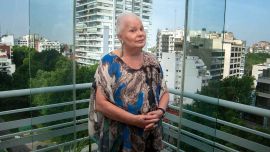Buenos Aires, the world’s bookshop capital, has had a long love affair with literature, but it seems even Argentina’s most-beloved pastime is not immune from the economic crisis that continues to spike inflation rates and shake up industries across the board.
In its 2018 report, the Argentine Chamber of Books (Cámara Argentina Del Libro, CAL) found that for the fourth consecutive year, there has been a drop in sales in bookstores. From May to October of last year alone, book sales fell 12 percent.
Production has suffered as well. In the first two months of this year, 35 percent fewer books were produced than in the same period of 2018, data shows. If these numbers are compared with data taken from the first quarter of 2016, the fall is around 50 percent.
But as the 45th annual Buenos Aires International Book Fair kicked off on Thursday, publishers, distributors, booksellers, illustrators, librarians and readers came together with a tone of optimism, seeking once again to enjoy books, participate in cultural activities and engage in discussion about the state of the industry.
Inaugurating the largest literary event in Latin America, which will run until May 13, Buenos Aires City Culture Minister Enrique Avogadro called the fair “a place of enjoyment and celebration” as well as “a fundamental place to strengthen the publishing sector.” He highlighted the various initiatives associated with the fair, such as the Read to Believe programme, “which allows the purchase of books for students of public schools in the City – 330,000 in 2018 and more than seven million since 2008.”
María Teresa Carbano, the president of Fundación El Libro, the organiser behind the event, also spoke on the opening day. She warned that “the industry needs to move forward” but conceded that “when its survival is so day-today, it is hard to do so.”
Carbano, the first woman to hold her current position, defined the fair as “a celebration of culture to strengthen our creative capacity,” before noting the industry “is going through a crisis.”
She noted that in 2018, there were 43 million copies produced, compared to 83 million in 2015. In the first quarter of 2019, those numbers are still in decline.
“The economic crisis has made the editorial industry resentful and bitter, just like any other industry in Argentina,” said Sebastián Lidijover, head of press and communications at Riverside Agency, one of the many distributors running a booth in this year’s fair. “It has affected people’s ability to buy books simply because it’s already difficult for them to pay their rent on time or to buy groceries.”
The issue goes beyond consumers’ ability to buy books. In a 2019 study, global e-commerce platform Picodi found that 34 percent of Argentines said they don’t spend time reading, a figure that has been in decline for years.
These reading habits spell trouble for workers in the field. According to the CAL report, over the last two years, direct employment in the publishing sector has been cut by 20 percent. Indirect employment, which encompasses the tasks of translators, editors, designers and other agents involved in book production, has fallen 15 percent.
FEELING THE EFFECTS
Small booksellers are feeling the effects of the recession as well. From 2016 to 2018, 35 small bookstores were forced to close. Another 30 were absorbed by chains or, due to unrelenting increases in maintenance costs, like rent and electricity services, had to reduce their spaces.
“You can tell that we are in a recession,” said Liliana Libedinsky Brandt, owner of boutique bookstore Caleidoscopio Libros. She has spent 25 years personalising the book-buying process at her shop in Belgrano R.
“There were people who would come and buy three books, and now they are buying one. Or they buy one, and their friend buys another one, and they exchange them,” she said.
Libedinsky remains optimistic, however, indicating the value of customer loyalty. “But they keep coming,” she smiles. Boutique shops rely on their loyal customer bases, and on the small touches that differentiate them from chains.
“We definitely have regular customers and they make up a considerable backbone of the store,” said Benjamin Harguindey, manager at Walrus Books, an English-language bookstore that has also been weathering the ups and downs of the Argentine economy for over a decade.
“The prices hike up, definitely,” Harguindey said, speaking on the effects of the recession. ”As with any small business dependent on the fluctuation of the dollar, there’s a general up and down throughout the year. At the end of the day, we really luck out being the only store of its kind in the city.”
Despite the troubling findings detailed in the CAL report, publishers and booksellers alike remain cautiously hopeful that the industry could bounce back.
“We’re all hoping, but this is an election year. If you look at the numbers now, they’re numbers associated with the crisis, and it’s unclear whether or not things will get better in the next few months, but we’re all working towards that goal,” said Lidijover. “We have to be optimistic.”
Lidijover and the Riverside Agency’s goals for the 2019 fair are modest – to sell the same amount of books as the year before. Similarly, bookstore owners are just doing what they can to push back against the recession.
“Right now we’re having a crisis. But Argentina is always in a crisis,” said Libedinsky Brandt. “We know how to deal with inflation. There’s nothing nice about it, and it’s very hard. But we survive, we are here!”


























Comments